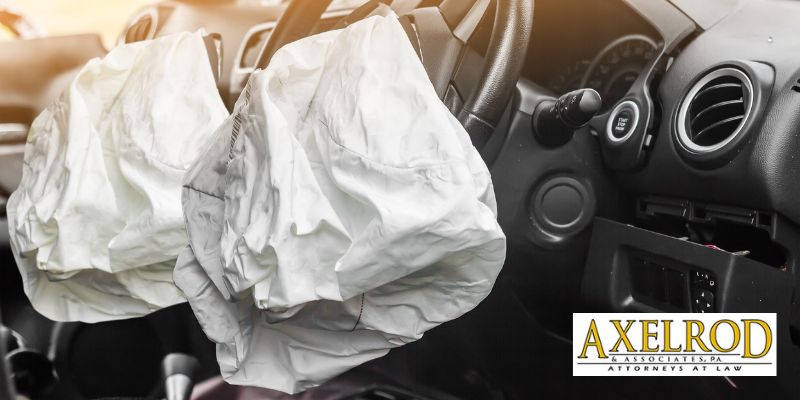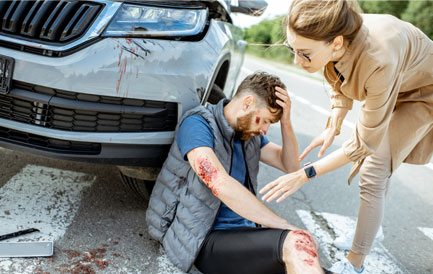4701 Oleander Drive, Suite A
Myrtle Beach, SC 29577
4701 Oleander Drive, Suite A
Myrtle Beach, SC 29577
Conway Car Accident Lawyer
Conway Car Accident Attorney
Conway, South Carolina, a small city in Horry County, is a beautiful place to call home. With its scenic landscapes and charming small-town atmosphere, it’s no wonder many people choose to live or visit here. However, like many places across the United States, Conway is not immune to the dangers of car accidents. Car accidents are all too common on its roads, highways, and interstates.
Whether it’s due to distracted driving, speeding, or other factors, car accidents in Conway can result in personal injuries, property damage, and even fatalities. If you have become a victim of a car accident in Conway, SC you need reliable and experienced personal injury lawyers to help you get the compensation you deserve.

Experienced Conway Car Accident Attorneys
At Axelrod & Associates, our Conway car accident lawyers will fight for your rights and provide the legal representation you need. We understand that each personal injury case is unique, so we take the time to listen to your story and devise a strategy tailored to you. We pride ourselves on our ability to advocate for our clients in and out of the courtroom, and we are willing to go the extra mile to get you the fair outcome you deserve. Our attorneys have a wealth of experience in car accident cases, and we are dedicated to helping you get the justice you deserve.
Axelrod & Associates is here if you have been injured in a car accident in Conway, South Carolina, and are looking for a reliable attorney to help you get the compensation you deserve. Our experienced team of Conway car accident lawyers has the compassion and knowledge necessary to help you get a favorable outcome in your case.
What Are the Most Common Reasons Why Car Accidents Occur in Conway?
Car accidents occur in Conway, South Carolina, for several common reasons. Some of the most frequent causes of car accidents in Conway include the following:
- Distracted Driving: Driving while distracted is a behavior that is dangerous and can cause accidents. Some common examples of distracted driving include texting or talking on the phone while driving, eating, grooming, or adjusting the radio or GPS. When drivers are distracted, their attention is taken away from the road, and they may not see hazards, other drivers, or pedestrians. This can lead to collisions or other accidents.
- Speeding: Driving above the posted speed limit is another major cause of car accidents in Conway. It could also include driving too fast for current road conditions. Speeding reduces a driver’s time to react to unexpected situations and increases the force of impact in a collision. Speeding can also cause a driver to lose control of their vehicle, especially on curves or in wet or slippery conditions.
- Driving Under the Influence: This serious offense can lead to accidents with severe injuries or fatalities. Impaired drivers have slower reaction times, reduced coordination and judgment, and may be more prone to reckless behavior. Alcohol is involved in more than a quarter of all fatal crashes in South Carolina.
- Reckless Driving: Reckless driving includes a range of dangerous behaviors such as tailgating, weaving in and out of different lanes, running red lights or stop signs, and making illegal turns. These actions can cause drivers to lose control of their vehicles or put other drivers, passengers, or pedestrians at risk.
- Poor Weather Conditions: Weather conditions such as heavy rain, fog, or ice can make the road slippery and reduce visibility. Drivers who do not slow down and adjust their driving to account for these conditions may be more likely to cause an accident. For example, if a driver continues to drive at the same speed on a wet road, they are more likely to hydroplane and lose control of their vehicle.
- Poor Road Conditions: Poor road conditions, such as potholes, uneven surfaces, or debris on the road, can also lead to car accidents. These conditions can cause a driver to lose control of their vehicle or puncture a tire, leading to a collision. In some cases, poor road conditions may also cause a driver to swerve to avoid an obstacle, potentially colliding with another vehicle or pedestrian.
Any combination of these factors can contribute to an accident. While no one can control the actions of other drivers, being aware of the risks and taking precautions can help reduce the possibility of an accident.
What Injuries Can Occur From Car Accidents in Conway?
Car accidents can cause many injuries, ranging from minor cuts and bruises to severe and life-threatening conditions. In Conway, South Carolina, some of the most common injuries that can occur from car accidents include the following:
- Whiplash: Whiplash is a common injury when the head is suddenly and forcefully jerked back and forth. This can cause damage to the neck muscles and ligaments, leading to pain, stiffness, and reduced range of motion. Whiplash can also cause headaches and dizziness.
- Broken Bones: The impact of a car accident can cause bones to break or fracture. The most commonly broken bones in car accidents include the ribs, arms, legs, and pelvis. Broken bones can be very painful and may require surgery or other medical treatment.
- Head Injuries: Head injuries can range from minor concussions to more serious traumatic brain injuries (TBI). Even a minor head injury can have long-lasting effects, including headaches, memory loss, and difficulty concentrating. More severe head injuries can cause permanent brain damage or even death.
- Back and Spinal Cord Injuries: Back and spinal cord injuries can be severe and may cause permanent disability. Injuries to the spinal cord can lead to paralysis, loss of sensation, and other complications. Back injuries can cause chronic pain and may require surgery or other medical treatment.
- Soft Tissue Injuries: Soft tissue injuries can occur in any part of the body. These injuries can include sprains, strains, and contusions, which can be painful and may limit a person’s mobility. Soft tissue injuries can also take a long time to heal, impacting a person’s ability to work or perform other activities.
- Internal Injuries: Car accidents can also cause internal injuries, such as damage to the organs. These injuries may not be immediately apparent and can be difficult to diagnose. Internal injuries can be life-threatening and require immediate medical attention.
- Emotional Trauma: In addition to physical injuries, car accidents can also cause emotional trauma. This can include anxiety, depression, post-traumatic stress disorder (PTSD), and other psychological conditions. Emotional trauma can significantly impact a person’s quality of life and may require counseling or other forms of treatment.
What Evidence Can Demonstrate Fault in a Car Accident Case?
In a car accident case, it is critical to establish fault to determine who is responsible for the accident and who should be liable for damages. Evidence plays a crucial role in establishing fault in a car accident case, and several types of evidence can be used to demonstrate fault:
- Police Report: A police report is critical evidence in a car accident case. It provides essential details about the accident, including the date, time, location, and the names and contact information of witnesses and the parties involved. The police report may also include a preliminary determination of fault based on the officer’s investigation of the accident. The report may include information about traffic violations, such as speeding or running a red light, or other factors contributing to the accident, such as poor weather or road conditions.
- Eyewitness Accounts: Eyewitness testimony can be a powerful tool in establishing fault in a car accident case. Witnesses may have seen the accident or the events leading up to the accident and can provide valuable information about the actions of the drivers involved. Eyewitness accounts can be significant in cases where there is a dispute about who was at fault. Witness statements can help establish the speed and direction of the vehicles, whether a driver was distracted, and whether any traffic laws were violated.
- Photographs and Videos: Photographs and videos of the accident scene can provide vital evidence to help establish fault. Photos and videos can show the position of the vehicles after the accident, the damage to the vehicles, and the road and weather conditions at the time of the accident. This evidence can help reconstruct the accident and identify the cause. For example, a photograph of a rear-ended car may show the extent of the damage and the angle of impact, helping to establish fault.
- Medical Records: Medical records can provide valuable evidence supporting a fault claim. Medical records can show the extent and severity of injuries sustained in the accident and help establish a causal link between the accident and the injuries. Medical records can also provide evidence of any pre-existing conditions that may have contributed to the injuries sustained in the accident.
- Accident Reconstruction: In some cases, accident reconstruction experts may be used to analyze the evidence and reconstruct the accident. Accident reconstruction experts can use physical evidence, such as skid marks and vehicle damage, to determine the speed and direction of the vehicles involved in the accident. This information can be used to establish fault. Accident reconstruction can also help identify other factors that may have contributed to the accident, such as poor road design, maintenance, or a vehicle defect.
- Cell Phone Records: In cases where distracted driving is suspected as a cause of the accident, cell phone records can be a source of evidence. Cell phone records can show whether a driver was using their phone at the time of the accident, whether they were texting or talking on the phone, and how long the call or message lasted. This evidence can be used to establish that the driver was distracted and may have contributed to the accident.
- Vehicle Maintenance Records: Maintenance records can provide necessary evidence in cases where a vehicle defect is suspected to be the cause of the accident. Maintenance records can show whether the vehicle was properly maintained, whether any repairs were made that may have contributed to the accident, and whether the vehicle was subject to any recalls. This evidence can be used to establish that the vehicle was not in proper working order and may have contributed to the accident.
What Is the Process of a Car Accident Case in Conway, South Carolina?
The process of a car accident case in Conway, South Carolina, can be complex and involve multiple steps. Here is a general overview of the process:
- Seek Medical Treatment: The first step after a car accident is to seek medical treatment for any injuries sustained in the accident. Documenting all injuries and treatments received is essential, as medical records can be crucial evidence in the case. A healthcare professional will evaluate the injuries and create a treatment plan, which may include follow-up appointments or referrals to specialists.
- Contact an Attorney: The next best step is to contact an experienced car accident attorney after seeking medical treatment. An attorney can review the case, provide guidance on the available legal options, and help gather evidence to support the case. The attorney will also explain the legal process and what to expect during each stage of the case.
- Investigation: The attorney will investigate the case to determine who was at fault and what damages were sustained. This may involve gathering evidence such as police reports, witness statements, photographs and videos of the accident scene, medical records, and any other relevant evidence. The attorney may also consult with accident reconstruction experts or other specialists to determine the cause of the accident and who is at fault.
- Demand Letter and Negotiation: Once the attorney has gathered sufficient evidence, they will negotiate with the insurance company of the at-fault party to settle. This may involve sending a demand letter to the insurance company outlining the damages sustained and the amount of compensation being sought. The insurance company may respond with a settlement offer, and negotiations may continue until an agreement is reached.
- Litigation: If a settlement cannot be reached through negotiation, the case may proceed to litigation. This involves filing a lawsuit in court and presenting the evidence to a judge or jury. A trial may take several months or even years, and the case outcome will depend on the strength of the evidence presented. During the litigation phase, both parties will engage in discovery, which is exchanging information and evidence related to the case.
- Settlement or Verdict: If the case is settled or a verdict is reached in favor of the plaintiff, the at-fault party or their insurance company will be required to pay damages to the plaintiff. Damages may include hefty medical expenses, lost wages, pain and suffering, and other costs associated with the accident. The total amount of damages awarded will depend on the evidence presented and the judge or jury’s decision.
- Appeal: If either party is dissatisfied with the case’s outcome, they can file an appeal. This involves filing a motion in court to review the case and potentially reverse the decision. The process of an appeal can be complicated and time-consuming, as it involves presenting evidence and legal arguments to a higher court.
FAQs About Conway, SC Car Accident Laws
How Long After an Accident Can You Sue in South Carolina?
In South Carolina, the statute of limitations for filing a personal injury lawsuit is three full years from the date of the accident. If you do not file a lawsuit within that established time, you may lose your right to do so. However, building a solid case can take time, and waiting too long to contact an attorney can make it more challenging to gather evidence and build a strong case.
What Should You Do in Case of an Accident in South Carolina?
If you are involved in a car accident in South Carolina, the priority is to seek medical attention for any injuries. It is also important to contact the police and report the accident, even if it seems minor. Make sure to exchange detailed contact and insurance information with the other driver, and gather as much evidence as possible, such as photographs of the accident scene and vehicle damage. Contact your personal insurance company to report the accident and provide them with the necessary information.
How Does a Car Accident Attorney Help?
A car accident attorney can help in many ways, including investigating to determine who is at fault, gathering critical evidence to support your claim, negotiating with the insurance company to reach a fair settlement, and representing you in court if necessary. An attorney can also advise you on communicating with the insurance company and ensuring your rights are protected throughout the process.
What Type of Compensation Can You Seek in a Car Accident Personal Injury Lawsuit?
If you file a car accident lawsuit, you may be able to seek compensation for medical bills, lost wages, property damage, pain and suffering, and other costs associated with the accident. The amount of damages awarded will depend on the facts of the case and the judge or jury’s decision. An attorney can help you determine how much compensation you can recover.
Contact Axelrod & Associates Today
If you have been injured in a Conway car accident caused by another person’s negligence, contact Axelrod & Associates for legal help. Our experienced team of attorneys will fight to ensure you receive the maximum compensation possible. We have decades of experience representing clients in South Carolina car accident cases and are committed to providing personalized attention to every client. Contact us today for a consultation.
Need help? Contact Axelrod & Associates, P.A.

Request your
Consultation
The fields marked with * are mandatory.






